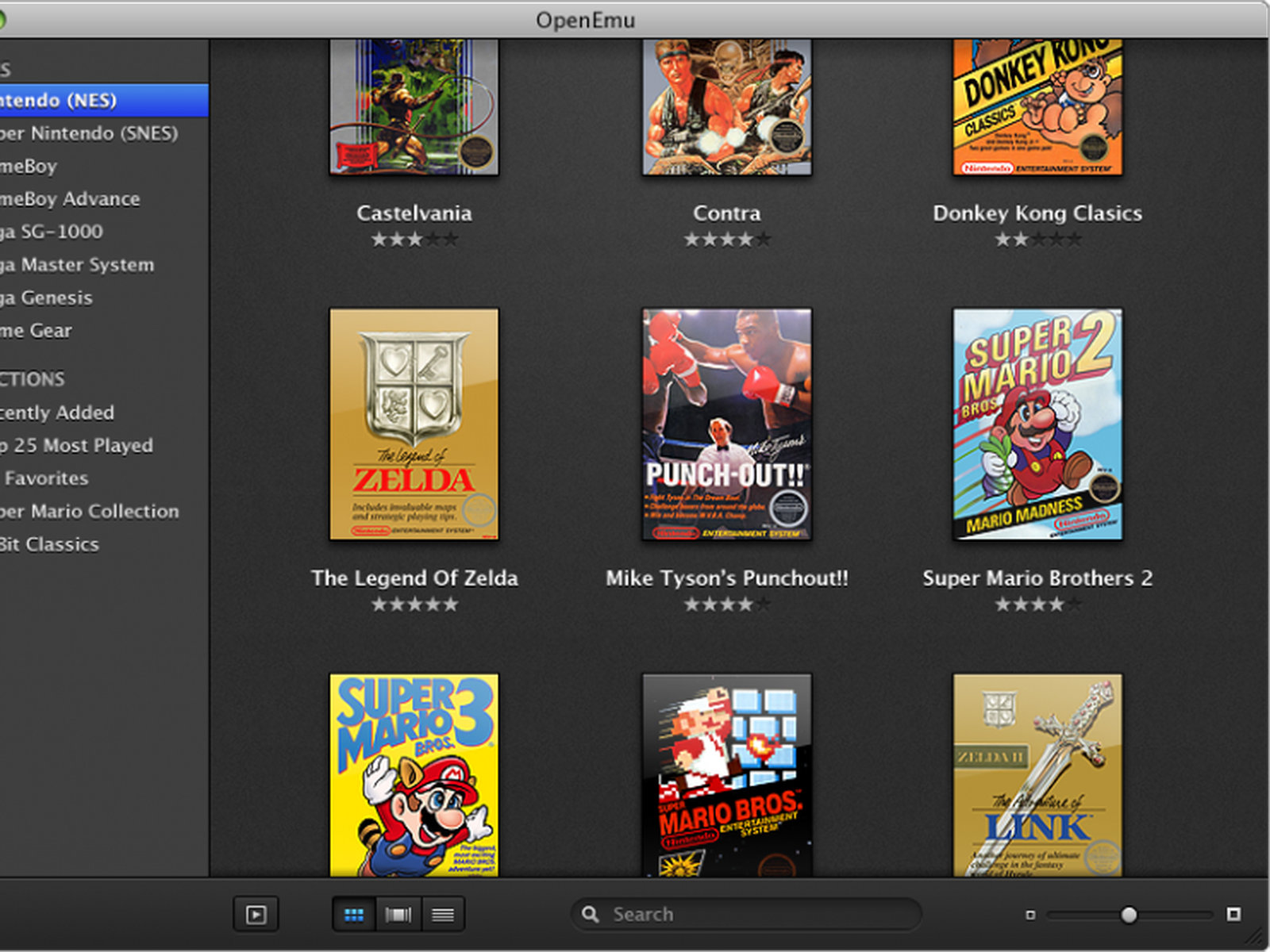OpenEmu is a macOS application designed to offer support for multiple emulation engines in order to help you keep all your vintage games in the same place. OpenEMU looks incredible. It reminds me a little of the Rom Collection Browser plugin for XBMC (soon to be Kodi) except it seems easier to use but with less features. It looks like it's combined a lot of open source emulators into one application, similar to MESS but with a very nice GUI in front. File Name: OpenEmu2.0.6.1.zip File Size: 41.48 MB System: Multiple Systems Version: 2.0.6.1 Downloads: 619,887 Requires OS X 10.11 or higher. An all-in-one emulator.
| Original author(s) | Josh Weinberg |
|---|---|
| Developer(s) | OpenEmu Team |
| Stable release | |
| Repository | |
| Written in | Objective-C |
| Operating system | macOS |
| Size | 74.0 MB |
| Available in | English |
| Type | Video Game Emulator |
| License | BSD |
| Website | openemu.org |
OpenEmu is an open-source multi-system game emulator designed for macOS. It provides a plugin interface to emulate numerous consoles' hardware, such as the Nintendo Entertainment System, Genesis, Game Boy, and many more. The architecture allows for other developers to add new cores to the base system without the need to account for specific macOS APIs.

Version 1.0 was released on December 23, 2013, after a lengthy beta testing period.[1] Numerous incremental updates have been released since then, with plans to incorporate support for more consoles in future releases. Some of these in-development cores are available to download in an optional 'experimental' cores build (released alongside the regular, 'standard' version), containing support for arcade systems using MAME.
History[edit]
Beginnings[edit]
OpenEmu was first released on Wednesday, July 4th, 2007 as OpenNestopia, a Cocoa-port written by Josh Weinberg for then Mac OS X 10.4 Tiger of the NES/Famicom emulator Nestopia (written by Martin Freij).[2] Weinberg and his friend, Ben Devacel, began searching for more developers to port other emulators to macOS, which led to the name change to OpenEmu in 2009, to better describe the multi-system emulator.[3]
1.0[edit]
OpenEmu 1.0 released on Monday, December 23, 2013 with 12 'cores' emulating Nintendo, Sega, NEC, and SNK's home, tabletop, and [[HanOpenEmu 1.0 needed Mac OS X Lion (10.7.x) to run. A Wednesday, October 15, 2014 (296 days later) midstream update to the OpenEmu library (1.0.4) would introduce Stella, a core emulating the 2600, a 2nd generation cosole from Atari.
2.0[edit]
Introduced on Wednesday, Dec 23, 2015, (exactly two years after 1.0) OpenEmu 2.0 was released. OpenEmu 2.0 began requiring a minimum of OS X El Capitan 10.11, dropping support for Mac OS X Lion (10.7.x) through OS X Yosemite (10.10.x). OpenEmu 2.0 introduced 16 new cores along with hundreds of bug fixes and lesser features. The new cores added several 2nd generation cores, support for optical media-based-image games, additionally emulating systems from Sony, Mattel, Bandai, Magnavox, Milton-Bradley, and Coleco. Another midsteam update, 2.0.6.1, released Tuesday, Dec 19, 2017 (727 days after 2.0) added support for Mednafen's Sega Saturn branch, with a suggested quad-core i7 CPU to emulate.

2.1 and 2.2[edit]
OpenEmu 2.1 (Friday, October 15, 2019, 675 days after version 2.0.6.1; 'coincidentally,' exactly 5 years after the 1.0.4 Stella update) was significant, not for any new cores, but for supporting Metal, Apple's visual API successor to OpenGL and OpenCl, giving OpenEmu significant gains in both performance and battery life.
OpenEmu 2.2 (Friday December 27, 2019, 63 days later) added support for a downstream, Metal-forked version of Dolphin's GameCubebranch, building on 2.1's foundation. This brings OpenEmu's number of supported cores to 31.
Limitations[edit]
32X Hybrid Games[edit]
Openemu Mac
As confirmed by the OpenEmu developers on their official subreddit, Sega 32X-CD hybrid games (versions of games that could use a 32X cartridge and Sega CD at once, such as Night Trap, Corpse Killer, and Fahrenheit) are not supported. Users are prompted with a 'This game requires the Sega 32X attachment' error if attempted.[4]
GameCube Limitations[edit]
At present, GameCube emulation doesn't support Save States (due to continual updates breaking compatibility with saved states); users are encouraged to use in-game saves.
OpenEmu GameCube emulation also does not support the 22 multi-disc GameCube titles at present (despite the main Dolphin branch doing so).
Features[edit]
OpenEmu features a backend that uses multiple game engines while maintaining the familiar, native macOS frontend UI. It also uses modern macOS technologies such as Cocoa and Quartz.[5] A unique feature of OpenEmu is its ROM library, which allows one to import ROM files and view them in a gallery type setting, similar to iTunes. Game info and cover art can be automatically added from OpenEmu's databases.
OpenEmu includes the following features:
- High-quality Metal (formerly OpenGL) scaling, multithreaded playback, and other optimizations[6]
- Real-time 3D effects and image processing
- Graphic filters to enhance display
- Full-screen support
- Ability to play multiple ROMs at once
- Ability to scan attached disks for ROMs
- Automatic downloading of game info and cover art
- Ability to use custom cover art
- Can play ROM hacks for multiple systems.
- A fully featured library, supporting multiple views, collections (categories), and game ratings
- Optional automatic organization of ROM files within the library folder
- Full save state support, including automatic save states
- Enhanced gamepad support for USB controllers and accessibility to Bluetooth (including DualShock 3 controllers, DualShock 4 controllers, Xbox 360 controllers and Xbox One controllers)
- Custom cores for custom systems (For systems like Wii)
Compatibility[edit]
| System | Core | OE Version | macOS compatibility | |
|---|---|---|---|---|
| 10.7–10.10 | 10.11–10.14 | |||
| Arcade (experimental version) | M.A.M.E | 2.0.8 | ||
| Atari 2600 | Stella | 1.0.4 | ||
| Atari 5200 | Atari800 | 2.0 | Does not appear | |
| Atari 7800 | ProSystem | 2.0 | Does not appear | |
| Atari Lynx | Mednafen | 2.0 | Does not appear | |
| ColecoVision | CrabEmu | 2.0 | Does not appear | |
| Famicom Disk System | Nestopia | 2.0 | Does not appear | |
| Game Boy / Color | Gambatte | 1.0 | ||
| Game Boy Advance | mGBA | 1.0 | ||
| GameCube** | Dolphin | 2.2 | Does not appear | |
| Game Gear | Genesis Plus GX | 1.0 | ||
| Intellivision | Bliss | 2.0 | Does not appear | |
| Neo Geo Pocket / Color | Mednafen | 1.0 | ||
| Nintendo 64 | Mupen64Plus | 2.0 | Does not appear | |
| Nintendo Entertainment System | FCEUX or Nestopia* | 1.0 | ||
| Nintendo DS | DeSmuME | 1.0 | ||
| Odyssey² / Videopac+ | O2EM | 2.0 | Does not appear | |
| PC-FX | Mednafen | 2.0 | Does not appear | |
| Sega 32X | PicoDrive | 1.0 | ||
| Sega CD / Mega-CD | Genesis Plus GX | 2.0 | Does not appear | |
| Sega Genesis / Mega Drive | Genesis Plus GX | 1.0 | ||
| Sega Master System / Mark III | Genesis Plus GX | 1.0 | ||
| Sega Saturn | Mednafen | 2.0.6/2.0.6.1 | Does not appear | |
| Sega SG-1000 | Genesis Plus GX | 2.0 | Does not appear | |
| Sony PlayStation | Mednafen | 2.0 | Does not appear | |
| Sony PlayStation Portable | PPSSPP | 2.0 | Does not appear | |
| Super Nintendo Entertainment System | higan or Snes9x* | 1.0 | ||
| TurboGrafx-16 / PC Engine / SuperGrafx | Mednafen | 1.0 | ||
| TurboGrafx-CD / PC Engine CD | Mednafen | 2.0 | Does not appear | |
| Vectrex | VecXGL | 2.0 | Does not appear | |
| Virtual Boy | Mednafen | 1.0 | ||
| WonderSwan / Color | Mednafen | 2.0 | Does not appear | |
* Default core plugin.[7]
** Version 2.1 and lower must have custom system core.
Reception[edit]
Upon its 1.0 release, OpenEmu was positively received, and subject to much online press coverage, praising the software's UI, features, and ease of use.[8][9][10][11] In particular, it was praised by the gaming community for '[bringing] the idea of an emulator for a mainstream, general audience to reality'.[12]
As of August 16, 2018, OpenEmu has been downloaded over 10,000,000 times since its version 1.0 release, making it one of the most popular multi-system emulators on macOS.[13]
See also[edit]
References[edit]
- ^https://github.com/OpenEmu/OpenEmu/releases
- ^'OpenNestopia'.
- ^'The Archive - An Emulator for the Rest of Us—How OpenEmu Changes Everything'.
- ^https://www.reddit.com/r/OpenEmu/comments/3zwu0t/32x_cd_support/
- ^'MacScene Listing'.
- ^'Create Digital Motion'.
- ^'OpenEmu Wiki - Home'. GitHub. Retrieved 16 August 2018.CS1 maint: discouraged parameter (link)
- ^Thorin Klosowski (2013-12-24). 'OpenEmu Emulates Nearly Every Classic Console on Mac'. Life Hacker. Retrieved 2014-04-10.CS1 maint: discouraged parameter (link)
- ^Alex Heath (2013-12-26). 'OpenEmu Is The Ultimate Old School Game Emulator For OS X'. Cult of Mac. Retrieved 2014-04-10.CS1 maint: discouraged parameter (link)
- ^Andrew Cunningham (2013-12-28). 'ArsTechnica OpenEmu Hands On'. Ars Technica.
- ^Sean Hollister (2013-12-28). 'Play classic video games in style with OpenEmu for Mac'. The Verge.
- ^'OpenEmu feature on The Archive'.
- ^'Github OpenEmu Release Download Stats'.
External links[edit]
- Official website
- OpenEmu on GitHub
OpenEmu is an open source video game emulation app for Mac that aims to bring all your favourite consoles to you in a single gorgeous app. The app uses a dark theme throughout and has a beautiful retro icon that is reminiscent of an arcade controller. I’ve been looking for a way to play the Game Boy Advance version of Final Fantasy IV on my Mac and downloaded OpenEmu on Mikhail’s recommendation.
When I first opened the app, I wasn’t expecting it to be very good-looking. However, I was pleasantly surprised when I saw the attention to detail. The dark colour scheme in OpenEmu fits really well with the app and I absolutely love the mini console icons used in the app’s side bar. The preference pane of the app uses delightful icons and has amazingly well made versions of every supported console’s controller. Apart from just looking good, OpenEmu is very simple to use. The app comes pre-packaged with several console emulators and gives you the option to install them just by checking on which ones you want. OpenEmu uses open source cores for emulating consoles such as the Nintendo DS, NES, SNES, Game Boy, Game Boy Advance, Sega 32X, Game Gear and more.

The app even gives you a Game (ROM) Starter Pack through their website to get you going. You can add your own games to the app via ROMs simply by dragging them in. If you already have some ROMs on your Mac, OpenEmu finds them automagically and adds them to your collection. If this wasn’t enough, the app also adds each game’s original box art to your library. You can organise your games as collections which show up in the side bar under your installed console emulators. Viewing your game library as a collection of boxes in cover-flow feels awesome.
Starting a game is as simple as double clicking on a ROM. The emulation begins almost instantly and everything I’ve tried so far has worked well. OpenEmu can integrate with hardware controllers and has provided a list of supported controllers on their GitHub page along with other useful information. You can configure the controller through the slick Controls tab in the Preferences menu or just use the keyboard instead. During gameplay, you can save your game at anytime by clicking the ‘save’ button in the emulator, something I found extremely useful while playing FF IV. If you exit the emulation during gameplay, OpenEmu remembers where you left off and starts the game from there the next time you launch it.
Openemu Mac Reddit
I only faced one issue while saving a game in OpenEmu. Attempting to overwrite a save file by tapping on it causes the emulation to begin from the previous save point instead of overwriting. It’s better to create a new save file. If you’re like me and want to play some of your favourite old games (ROMs) on your Mac, you should definitely check out OpenEmu, you won’t regret it. It’s available for Free on the OpenEmu website.